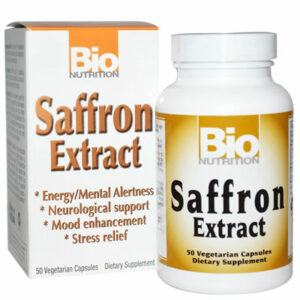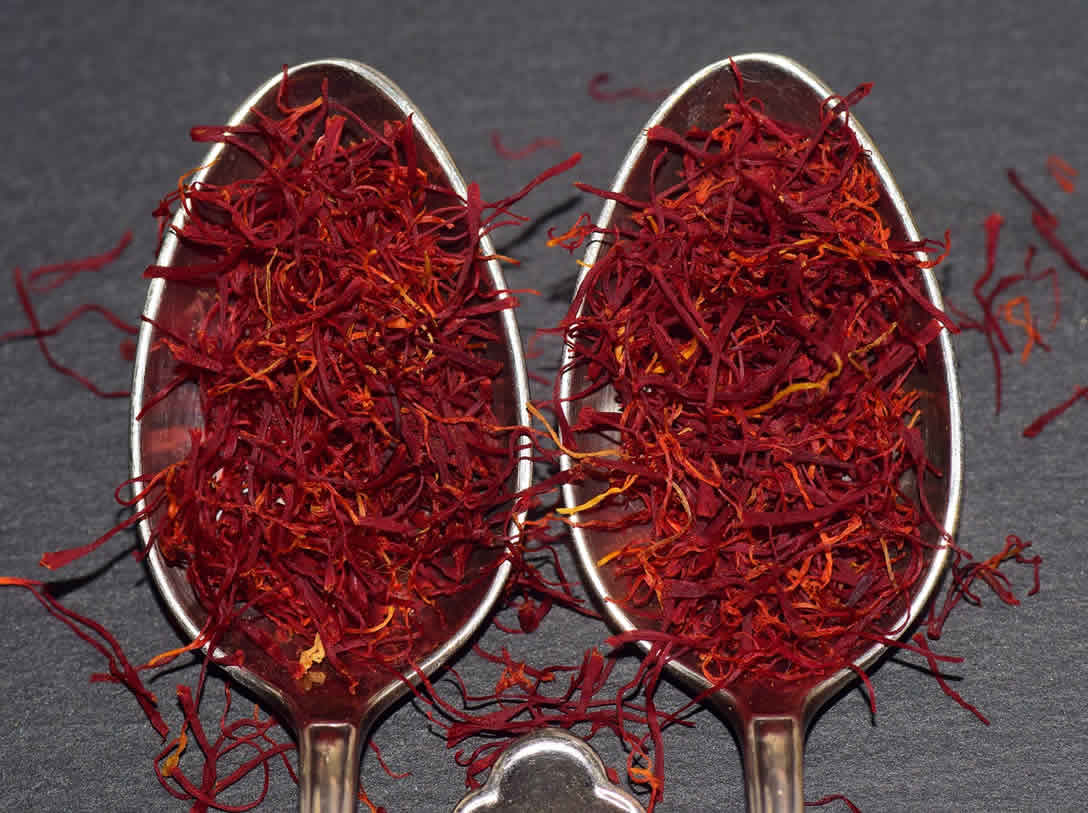Saffron is one of the most valuable spices in the world because of its unique smell, color, and fragrance. It is widely used in the manufacture of cosmetics and the preparation of food, as a colorant, flavoring agent and spice.
In addition, in traditional medicine, saffron has a variety of pharmacological effects and is often used as a sedatives, antispasmodic agent, aphrodisiac, antiperspirant, expectorant, stimulant, stomachic medicine, an anticancer drug, and digestive aid Medicine and cold medicine.
Do you know the benefits of saffron supplements? For more details, see the article below.
Table of Contents
- What is saffron?
- What are the benefits of saffron?
- Are there any side effects of saffron?
- Safety precautions
- Where to buy the most recommended saffron extract capsules?
What is saffron?
Saffron is a perennial stemless herbaceous plant belonging to the iris family, which is cultivated in Iran, Greece, Spain, China, and Turkey.
The commercial value of saffron is its stigmas. Each flower has only three stigmas. It takes 3 years from seed to flowering, so it increases its scarcity.
The chemical composition of saffron is 63% sugar, 12% protein, 10% moisture, 5% crude fiber, 5% fat and 5% minerals
Its medicinal value depends on the existence of three main secondary metabolites: crocin, picrocrocin, and safranal.
What are the benefits of saffron?
1. Saffron is beneficial for blood lipid regulation
Dyslipidemia is a systemic lipid metabolism disorder characterized by a reduction in total blood cholesterol, triglycerides, low-density lipoproteins, and /high-density lipoproteins.
It is a major component of metabolic syndrome, including abdominal obesity, systemic inflammation, insulin resistance, high blood pressure, and hyperglycemia
A systematic literature review and meta-analyses (including 14 randomized controlled trials with a total of 788 participants) pointed out that saffron extract can reduce total cholesterol and triglycerides (but mo significant effect on body weight and LDL cholesterol concentration).
*Conclusion: Saffron may have a positive effect on the regulation of blood lipids, but it is limited by the heterogeneity of the included studies and the small number of samples.
2. Saffron is good for depression
Depression is a potentially life-threatening disease that affects hundreds of millions of people worldwide. About one-fifth of adults have experienced depression, and women are twice as likely to suffer from depression.
Psychopathology of depression includes three main symptoms: depression or depression, lack of pleasure, lack of energy, or fatigue. Other symptoms, such as sleep and psychomotor disturbances, guilt, low self-esteem, suicidal tendencies, and autonomic nervous disorders also frequently occur.
A meta-analysis (including 11 randomized controlled trials, a total of 500 patients with mild to moderate depression) pointed out that saffron is significantly better than placebo (for HAM‑D and BDI) in improving depression table, and do not lose to SSRIs (selective serotonin reuptake inhibitors, such as fluoxetine, citalopram), but the optimal dose and duration of treatment are not yet clear.
The underlying mechanism may be related to regulating the levels of certain chemical substances in the brain, including serotonin and inhibiting the reuptake of serotonin in the synapse.
*Conclusion: Saffron (saffron) may be helpful for improving depression but limited by the risk of possible bias, more large randomized trials are needed to support it.
3. Saffron benefits erectile dysfunction
Erectile dysfunction can be defined as the failure to achieve or maintain a penile erection in order to obtain satisfactory sexual performance.
Many factors can disrupt the normal physiological mechanisms involved in erection, in addition to the most common aging, there are other psychological (depression, anxiety), nerve (peripheral nervous system disease, epilepsy, demyelinating disorder, brain or spinal cord injury), hormones, blood vessels (atherosclerosis), drugs (hypertensive drugs, antidepressants, estrogen, antiandrogens), lifestyle patterns (marijuana use, alcoholism, smoking) And other diseases.
A literature review and meta-analysis (including 6 randomized controlled trials) pointed out that saffron has a significant positive effect on all dimensions of the Erectile Function questionnaire, including erectile function, orgasm function, and overall satisfaction, satisfaction with sexual intercourse and sexual desire.
However, regarding the improvement of semen-related parameter values (sperm density, morphology, and motility), different conclusions have yet to be confirmed.
*Conclusion: Saffron may be positive for improving male sexual dysfunction, but it is limited by the heterogeneity and methodological flaws of the included studies, and more research is needed to corroborate it.
4. Saffron benefits type 2 diabetes
Diabetes is a group of chronic metabolic diseases characterized by a phenomenon in which the body’s inability to produce insulin or resistance to insulin action, or both, leads to an increase in blood sugar.
Diabetes affects many different organ systems in the body and, over time, can cause serious complications.
Common microvascular complications include damage to the nervous system (neuropathy), damage to the kidney system (nephropathy), and damage to the eye (retinopathy).
Macrovascular complications include cardiovascular disease, stroke, and peripheral vascular disease, among which peripheral vascular disease may cause unhealed bruises or injuries, gangrene, and ultimately lead to amputation.
A three-blind randomized clinical trial (8 weeks, 54 patients with type 2 diabetes) pointed out that compared with placebo, oral saffron extract capsules have the effect of reducing fasting blood glucose, but other indicators such as blood lipid, blood pressure and There was no significant improvement in glycated hemoglobin.
*Conclusion: For patients with type 2 diabetes, oral saffron extract can improve blood sugar control by reducing fasting blood glucose, but the results still need to be supported by more large-scale trials.
5. saffron is beneficial for premenstrual syndrome
Premenstrual syndrome or premenstrual dysphoric disorder is one of the most common clinical complaints of women of childbearing age. It usually appears 5 days before menstruation and disappears at the end of menstruation. The severity of symptoms varies from person to person.
Psychological symptoms of the premenstrual syndrome include irritability, depression, crying, and anxiety; physical symptoms include swollen abdomen, breast tenderness, and headache.
A double-blind, randomized placebo-controlled trial (2 months, 50 patients with premenstrual syndrome) pointed out that oral saffron extract capsules can effectively relieve the symptoms of premenstrual syndrome, and no obvious side effects.
The underlying mechanism may be related to the serotonergic effect of saffron.
*Conclusion: Saffron extract has a positive effect on improving premenstrual syndrome, but it is limited to a small number of samples and more large-scale trials are still needed to support it.
6. Saffron benefits Alzheimer’s disease
Alzheimer’s disease is the most common cause of dementia in Western society. In the United States, about 5.5 million people are affected, and the estimated number of patients worldwide is as high as 24 million.
Alzheimer’s disease is characterized by progressive cognitive decline. It usually begins with impaired ability to form recent memories, but it inevitably affects all intellectual functions, leading to the gradual loss of basic functions of daily life and premature death.
Pathological manifestations include diffuse and neuronal extracellular amyloid plaques and intracellular nerve fiber tangles, accompanied by reactive microglial hyperplasia, malnourished neurites, and the loss of neurons and synapses.
The root cause of these multifaceted changes is unclear, but age, genetic and non-genetic factors are believed to play an important role.
A randomized and placebo-controlled trial (a 16-week, 46 patients with mild to moderate Alzheimer’s disease) pointed out that compared with placebo, saffron extract capsules produced a significant improvement in cognitive function (Measured by ADAS-cog and CDR scales), and there were no significant differences in adverse events observed between the two groups.
*Conclusion: For patients with mild to moderate Alzheimer’s disease, the use of saffron extract capsules can help improve cognitive function, but limited by the small sample size, more experiments are still needed to corroborate.
Are there any side effects of saffron?
Saffron is considered a safe supplement at the proper dosage, but possible side effects or adverse reactions include dry mouth, anxiety, dizziness, drowsiness, nausea, change in appetite, headache, restlessness, allergic reactions.
High doses can cause poisoning, including yellow skin, eyes, and mucous membranes; vomiting, dizziness, bloody diarrhea, bleeding from the nose, lips, and eyelids, numbness, etc., which may be serious or even fatal.
Safety Precautions
1. Do not use if you are allergic to Lolium, Olea, and Salsola plants, as it may induce allergic reactions (eg urticaria, nasal congestion or difficulty breathing)
2. Pregnant women may cause uterine contractions or bleed, which may lead to miscarriage.
3. Do not use it for breastfeeding women (because the relevant safety is unknown).
4. Do not use in patients with bipolar disorder, which may trigger excitability and impulsive behavior (mania).
5. Do not use it for patients with cardiovascular diseases. Saffron may affect the rate and intensity of the heartbeat and may cause symptoms to worsen.
6. Do not use in patients with hypotension. Taking saffron may make hypotension worse.
7. The use of high doses (200 to 400 mg/day) may cause a slight reduction in red blood cells and platelets (but these changes are within the normal range).
Where to buy the most recommended saffron extract capsules?
In recent years, food safety problems in various countries have exploded, and it is not healthy but black-hearted products that everyone spends on. Therefore, European and American products with relatively strict quality control have become popular products.
And iHerb.com is a large-scale medical cosmetics e-commerce company in the United States. It has a high satisfaction rate of 97% in the evaluation of Google customers. It provides global home delivery so that you can buy it without risking buying fakes through purchasing high-quality health products.

